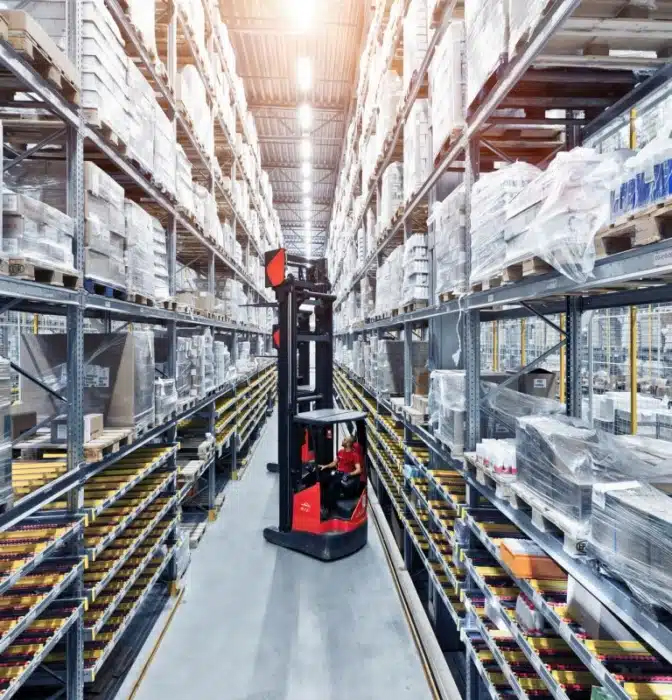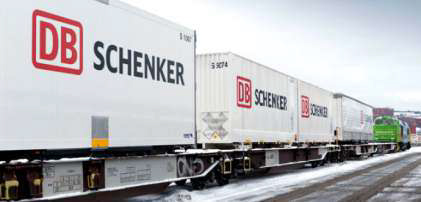Fueling a Greener Future: DB Schenker Ignites Sustainable Transformation in Air Cargo
As the pandemic’s grip on the world tightened, the aviation industry found itself in a freefall. Passenger flights were gone, the air cargo industry’s belly-hold capacity vanished, and traditional models crumbled.
In this maelstrom, DB Schenker, a global leader in logistics solutions which is part of the German Deutsche Bahn Group, defied the odds with a boldness that not only ensured its survival but also propelled it to new heights.
From the ashes of the crisis, DB Schenker’s adaptability rose like a light. In a mere year, it went from scrambling to fill capacity gaps to operating its own global freighter network, a fleet of iron wings stretching across continents with nearly 60 weekly flights.
This wasn’t just reactive improvisation; it was a masterclass in calculated risks, strategic alliances with key airlines, and a laser focus on efficiency. While others clung to outdated models, DB Schenker embraced the new normal, forging a future where resilience and agility became the cornerstones of success.
In an exclusive interview with Air Cargo Update, Bjorn Eckbauer, Senior Vice President of Global Operations and Procurement, Air Global Freight, demystifies DB Schenker’s sustained investment to air cargo. He reveals the strategic levers and transformative actions propelling DB Schenker towards a greener horizon, redefining what’s possible in sustainable air cargo.
Freighter Network Evolution
DB Schenker’s swift response to the initial challenges posed by the pandemic, where the depletion of belly-hold capacity and passenger flights prompted the establishment of its own freighter network. From one year initially intended, the program evolved into a global operation with nearly 60 flights per week, connecting major hubs in the Northern and Southern Hemispheres.
“We embarked on long-term charter contracts to meet the evolving demands,” Eckbauer reveals, highlighting the adaptability that became the hallmark of their operations.
“In those initial stages, the challenges were monumental. The absence of flights meant a depletion of lower deck capacity and passenger flights, which were traditionally relied upon. We had to establish our own freighter network swiftly, departing from conventional ACMI arrangements,” explains Eckbauer.
This initiative, initially designed for a one-year duration, surpassed expectations as the pandemic persisted. “Ultimately, our operations expanded to nearly 60 flights per week on a global scale. Primarily concentrated in the Northern Hemisphere connecting the US, Europe, and China, we also established connections into the Southern Hemisphere,” he shares, revealing the extensive scope of their adaptive measures.
Adapting to a New Normal
The narrative unfolds as DB Schenker recounts the transformative experiences and key learnings from the pandemic. The logistics giant shares insights into its shift away from traditional models, emphasizing adaptability and a strategic focus on a limited number of carriers during challenging times.
“The unexpected resurgence of the market prompted another reconsideration of our strategy,” Eckbauer remarks, illustrating the dynamic decision-making necessitated by the rapidly changing industry landscape.
Shedding light on the significant shifts in their operational approach, Eckbauer explains, “Historically, we operated with a vast array of carriers for both main and lower deck capacities. However, the disappearance of this model due to the profound impact of the pandemic necessitated a comprehensive reevaluation.”
“Our approach involved relying on capacity agreements with various airlines, sometimes accounting for up to 80% of capacity, particularly on passenger airlines. With the disappearance of this model due to the profound impact of the pandemic, a comprehensive reevaluation was imperative,” Eckbauer emphasizes, underscoring the necessity for strategic reassessment.
Market Dynamics and Revenue Strategies
Eckbauer addresses the complexities of fluctuating market rates, the challenges of predicting market recovery, and DB Schenker’s strategies to maintain relationships with carriers amidst a shrinking market.
“Despite the overall market shrinkage of 11 to 13 percent from 2022 to 2023, we maintained relationships with carriers,” he explains, shedding light on the resilience and strategic partnerships that sustain the company’s operations.
“The emphasis on working closely with a more restricted set of partners aimed at fostering strength and resilience in our operations within the evolving market conditions,” he adds.
Providing insight into the strategic rationale behind their approach while offering a detailed analysis of the nuanced market dynamics, Eckbauer continued, “It’s essential to consider the substantial disparity in rate levels between 22 and 23, as the latter is significantly lower. The comparison becomes challenging due to the marked differences in markets between 21, 22, and 23, all of which operate in shrinking markets with declining rates.”
“In analyzing the revenue for this year, it’s essential to consider the substantial disparity in rate levels between 22 and 23, as the latter is significantly lower. The comparison becomes challenging due to the marked differences in markets between 21, 22, and 23, all of which operate in shrinking markets with declining rates. In the current scenario, carriers are less focused on revenue and instead prioritize assessing tonnage. The primary concern is whether they experience growth in tonnage by collaborating with us or not,” he added.
Eckbauer further elaborates, “There’s a slight uptick in the market in terms of rates, albeit not constituting a genuine peak season. However, making a direct comparison proves challenging due to the unique circumstances. We transitioned from exceptionally high rates during the peak of the COVID-19 pandemic, which experienced a drastic decline last year in September and continued to drop significantly into 2023.”
“Anticipating the trajectory, we’ll maintain the current level until mid-December, encompassing this modest peak season or whatever designation we assign to it. Beyond that point, January poses a significant question mark, challenging to predict accurately,” Eckbauer estimates.
Eckbauer offers a comprehensive overview of the industry’s future trajectory, emphasizing, “Over the past three years, our predictions have yielded varying degrees of success across different markets. Examining the global economy, it appears doubtful that a resurgence will occur before the summer of the following year. No discernible signs indicate a swift recovery—automotive sectors are experiencing a downturn, and major high-tech entities report diminished volumes. Post-Chinese New Year, a rapid ramp-up toward a normal market doesn’t seem imminent; rather, it appears that such a transition will require a considerable amount of time.”
Green Logistics and Sustainable Practices
DB Schenker’s unwavering commitment to green logistics takes center stage in their significant efforts. Three years ago, the company pioneered this initiative with a groundbreaking collaboration with Lufthansa, introducing an exclusive flight operating between Frankfurt and PVG.
According to Eckbauer, “Our commitment to green logistics is a significant focus of our efforts. What sets this venture apart is the utilization of sustainable aviation fuel (SAF) equivalent to the full consumption of the aircraft. In fact, we exceeded a 100% offset, going above and beyond in our efforts. To minimize emissions, we integrated this eco-friendly fuel into the Frankfurt fuel network. Although direct burning of this fuel by the aircraft is technically unfeasible, our approach effectively eliminated, to the greatest extent possible, the emissions associated with that particular flight.”
This proactive measure showcases their commitment to offsetting carbon emissions and contributing to a sustainable future.
Customer Engagement Dynamics
Eckbauer discusses the dynamics of customer engagement in the journey toward sustainability. “It’s a mixed scenario,” he noted. “The majority of our clients have set clear carbon-neutral goals by either 2030 or 2035. While a significant number are actively investing in sustainable aviation fuel (SAF) and are willing to bear the associated costs, there remains a sizable portion that hesitates due to the considerable expense involved.”
Considering various factors such as routing, the additional cost typically ranges from EUR 150 to 160 per kilo—a substantial amount, especially for the cargo in question. In some instances, this cost even exceeds current rates for air freight. Despite these challenges, ongoing dialogue and a growing awareness of sustainable practices are marking positive developments.
Eckbauer notes, “We are witnessing a gradual shift with more clients, including smaller ones (clients with lower monthly volumes), expressing interest and making inquiries about incorporating SAF into their shipments. Since our initial venture, we’ve expanded our capabilities, and now, within our global network, every client has the option to offset CO2 emissions by choosing SAF for their shipments, marking a step forward in our sustainability efforts.”
Operational Sustainability Initiatives
Beyond championing Sustainable Aviation Fuel (SAF), DB Schenker actively explores diverse initiatives for environmental sustainability. The company is on the forefront of researching alternatives to foil in ULD (Unit Load Device) construction, aiming to minimize the ecological footprint. As stated by Eckbauer, “Our ongoing tests with eco-friendly alternatives underscore our commitment to creating positive environmental impacts. Simultaneously, we’re in the process of phasing out traditional wooden bars in ULDs, opting for sustainable cardboard alternatives.”
This commitment isn’t confined to internal changes. Collaborative endeavors with airlines identify key areas for supply chain improvements. DB Schenker also extends its sustainability pledge to trucking companies, urging them to adopt environmentally friendly practices. Initiatives like harnessing solar power on warehouse roofs and transitioning to LED bulbs showcase the dedication.
Recognizing that sustainability necessitates collective efforts, DB Schenker and Eckbauer actively pursue diverse avenues beyond SAF.
“While SAF remains pivotal, our multi-pronged approach ensures ongoing enhancements to environmental practices, contributing to a greener future,” Eckbauer emphasizes.
Strategic Vision and Industry Advice
When contemplating DB Schenker’s journey toward carbon neutrality, specific goals become pivotal. As outlined by Eckbauer, “Having clear objectives is paramount in our sustainability journey. While comprehensive change takes time, we’re making significant strides across various domains. In land freight, especially for inner-city logistics, the integration of electric vehicles is increasingly becoming a norm to mitigate our environmental impact. We adopt electric vehicle technology wherever feasible, even though its application in long-term line hauls is still evolving.”
In addition to transforming the land freight landscape, DB Schenker addresses environmental concerns within its operations. Eckbauer explains, “We’re actively phasing out traditional diesel or gas-run forklifts, replacing them with electric alternatives. These strategic shifts align with our commitment to minimizing the carbon footprint and embracing sustainable practices. Our approach is systematic, recognizing that progress is achieved through targeted initiatives across various facets of our operations.”
In anticipating forthcoming challenges in the air cargo industry, DB Schenker employs key strategies for the next six months. Eckbauer’s perspective urges the industry to break free from stagnation, stating, “We’ve remained unchanged for far too long, lagging in adopting common standards. The air freight community must foster improvement and catch up with evolving standards in other industries that have rapidly embraced change over the last decade.”
Expanding Horizons
Apart from DB Schenker’s strategic expansion into promising regions like Saudi Arabia, the company also places a significant emphasis on strengthening its presence in Ethiopia in the African continent.
Eckbauer acknowledges, “While a recent deal in Ethiopia eluded us, we remain actively engaged in these markets. The developments in Saudi Arabia, especially, are noteworthy, poised to become a hub akin to Dubai in the next five years due to its ambitious plans and rapidly growing economy.”
In regards to partnerships, Eckbauer confirmed its established setup in Saudi Arabia. Notably, recent regulatory changes allowing consolidated shipments instead of limiting arrangements to back-to-back present new opportunities.
“This regulatory shift, though promising, requires some fine-tuning. Ongoing efforts aim to navigate and optimize these changes, as they allow for deconsolidation within Saudi Arabia. We remain optimistic about leveraging these new possibilities for our operations in the region,” Eckbauer concludes, encapsulating the forward-looking perspective that defines DB Schenker’s approach to expanding its global footprint.
The experience of DB Schenker in air cargo is proof of its tenacity, flexibility, and perseverance to a more environmentally friendly future. Not only has it survived the storms, but it has come out stronger, changing the whole meaning of success in a changed environment. This story of creativity, smart alliances, and sustainability speaks not just of the here and now, but also of DB Schenker’s long-lasting history of raising the bar.





